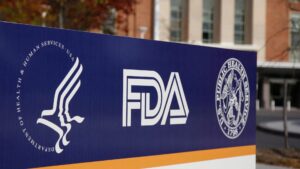Major Changes at the FDA: What You Need to Know About the Cuts to Staff Training and Public Health Programs
In a surprising turn of events, the Food and Drug Administration (FDA) is undergoing significant changes that could impact public health and safety initiatives across the country. Recent reports from CNBC reveal that the agency has laid off all staff in its Division of Learning and Organizational Development (DLOD), a crucial unit responsible for training FDA employees and external health-care professionals on vital safety and regulation practices.
Understanding the Cuts
The job cuts come as part of a broader plan instituted by Robert F. Kennedy Jr. to restructure the Department of Health and Human Services (HHS). This restructuring involves slashing a staggering 10,000 jobs across HHS, with roughly 3,500 of those positions located at the FDA. Proponents of the cuts argue that they’re necessary for "streamlining operations," but many public health advocates warn that the elimination of this training division may pose serious risks to both agency staff and health-care professionals.
While HHS has assured that the roles of inspectors and reviewers of drugs and food will not be compromised, reports indicate that the cuts may result in significant gaps in public health protection. Notably, the division that has been eliminated provided essential training programs in critical areas such as opioid safety, medication error prevention, and responses to infectious disease outbreaks.
Educational Impact: A Loss for Health Professionals
One of the most alarming aspects of these cuts is their effect on continuing education for health-care professionals. The DLOD’s cancellation of planned activities—including scientific and regulatory education—means that practitioners will no longer have access to structured training that helps them stay up-to-date with evolving medical knowledge and regulations. While state requirements often mandate a certain number of educational credits for licensing, the absence of accredited programs could lead to compliance issues for professionals striving to maintain their credentials.
In addition, the DLOD was responsible for organizing educational resources that informed health-care providers about emerging public health threats, including recent studies about tobacco use and its implications. The lack of availability of such training not only leaves gaps in knowledge but also heightens the risk of a disconnect between regulatory guidelines and real-world practice.
Professional Development at Risk
The implications of losing DLOD extend beyond immediate educational offerings. Staff at the FDA and related health-care professionals are now left without centralized resources for professional development and training, which could lead to inefficiencies in knowledge acquisition. As quoted by a concerned FDA employee, “With the removal of DLOD, there’s a great deal of uncertainty about how learners and professionals will adapt.”
By struggling to identify and select appropriate educational courses on their own, many professionals may miss essential training opportunities that keep them informed about best practices and advancements in their fields.
The Future Landscape of Health Education
With the dismantling of DLOD, it’s worth considering how health care and public service agencies can adapt in this new environment. Without the necessary training infrastructure, there are calls to action for both public and private entities to collaborate on new methods for professional education and development.
Moreover, the FDA has always collected user fees from companies producing drugs and medical devices to fund certain operations, including those within the DLOD. This raises questions about the appropriateness and effectiveness of funding distribution and whether alternative funding models could support the continuation of education initiatives crucial for public health.
Looking Ahead
While Kennedy has indicated that some personnel and programs impacted by these cuts may be reinstated, the uncertainty surrounding those decisions leaves many public health advocates on edge. Stakeholders, including health-care professionals and community members, need to remain vigilant as these changes unfold, demanding accountability and transparency in the education and training processes vital to public health.
At Extreme Investor Network, we believe that informed decision-making is crucial during times of uncertainty. We’re committed to keeping our readers informed about industry changes and advocating for effective public health practices. Stay tuned for further updates as we continue to analyze the implications of these significant cuts in the FDA and HHS. Your health and knowledge matter now more than ever!

